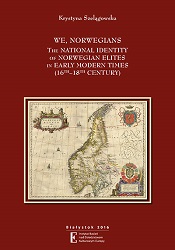WE, NORWEGIANS
WE, NORWEGIANS
THE NATIONAL IDENTITY OF NORWEGIAN ELITES IN EARLY MODERN TIMES (16TH–18TH CENTURY)
Author(s): Krystyna Szelągowska
Contributor(s): Magdalenaa Junkieles (Translator)
Subject(s): History, Cultural history, Diplomatic history, Economic history, Political history, Social history, Modern Age, 16th Century, 17th Century, 18th Century
Published by: Instytut Badań nad Dziedzictwem Kulturowym Europy
Keywords: national consciousness; early modern period; Norwegian history; elites; absolutic state
Summary/Abstract: The main purpose of this study is to analyze the national consciousness of the Norwegian elites in the 18th century, on the background of such identity in previous, 16th and 17th century. In the case of the earlier centuries the forms of national identity both in term of the upper classes and the peasant population are investigated. The beginning moment is associated with the loss of independence and incorporation to Denmark in 1536. As the ending point the so called conspiracy in Eda Skanse (1790) was chosen, the moment when four Norwegian merchants began to prepare a plan of breaking the union with Denmark and establishing, with the support from Sweden, an independent state. Nevertheless, this event should not be seen as evidence that such ideas were widespread, on the contrary it can be used rather as a symbol of changes. But in the next decade, the 90s, we can talk of national consciousness, which in fact was very close to modern nationalism. The turning point in the development of the national identity, and in Norwegian history as a whole, was the year 1660, when the absolutist regime was introduced in Denmark-Norway by the King Frederic III...
- Print-ISBN-13: 978-83-64103-14-8
- Page Count: 371
- Publication Year: 2016
- Language: English
- eBook-PDF
- Table of Content
- Introduction

